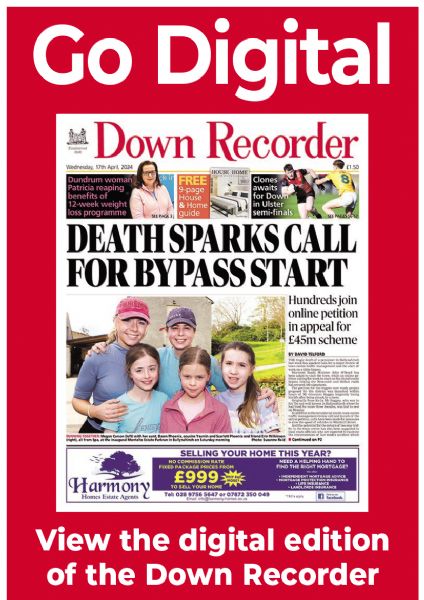Seriously ill man was turned away by Downe
Seriously ill man was turned away by Downe
27 July 2016
A CRITICALLY ill Ardglass man had his life saved outside the Downe Hospital last weekend after staff said there were no doctors on duty to help him.
Edward Murphy suffered a severe allergic reaction to an antibiotic he had been prescribed for a mouth infection and with his condition rapidly deteriorating, his distressed wife was told there were no doctors to help her husband and it would be “best if he went elsewhere.”
A rapid response paramedic — who had just started his shift — came to Mr Murphy’s aid directly outside the hospital as he struggled to breath as a result of an anaphylactic shock. Mrs Rebecca Murphy said her husband would be dead if the paramedic had not responded so quickly to her 999 call.
The Ardglass man was in the rear of her car en route to the Downe last Saturday afternoon when she noticed his eyes rolling in his head, that he was grey in colour, while his throat, wrists and fingers were badly swollen.
At the roundabout outside the hospital — which only provides minor injuries and an out-of-hours GP service at weekends— Mrs Murphy telephoned the Downe explaining to a staff member that her husband’s condition was “serious” and that she would be outside the emergency department in a matter of seconds. But she was told there were no doctors and only a minor injuries service available.
Mrs Murphy continued: “I told the woman I spoke to that my husband was ‘dying’ in the back of the car and that I would be there in a few seconds, but she told me there were no doctors and only a minor injuries service available. What happened was disgraceful.
“I said there was surely someone there who could help my husband who was clearly very ill but was told that it would be best if I went elsewhere. At that moment I pulled over close to Finneston House at the Ardglass Road and dialled 999, with a person from the Ambulance Service telling me to keep calm and make sure Edward wasn’t sick and not to give him anything to drink.
“The person stayed on the line with me and literally within a minute a paramedic arrived. He gave my husband oxygen and several injections, one of which was adrenaline. Another ambulance then arrived from Dundonald and my husband was taken to the Ulster Hospital.”
Mrs Murphy said she can’t thank enough the paramedic who saved her husband’s life and said his colleagues who arrived in the ambulance told her Edward was still alive because of what he did.
She continued: “One of the paramedics told me ‘I nearly lost my husband there.’ I cannot praise the ambulance staff highly enough for what they did.
Mrs Murphy said she is fortunate the paramedic who saved her husband’s life had just started his shift at the Downpatrick ambulance base, located just around the corner from where she stopped to make the 999 call.
“What happened last Saturday was a disgrace and one of the paramedics who helped my husband insisted that if he had been taken to the Downe there would have been people there to help him.”
Mrs Murphy added: ”It is crazy an area this size does not have a local A&E service available at weekends. Could out-of-hours GPs based at the Downe not have helped my husband? Paramedics have told me they would have been able to, yet I was told to go elsewhere.
“I have used the Downe before and cannot fault it. It is a state-of-the-art hospital which must be better utilised. The help my husband needed from the hospital should have been available last weekend but wasn’t. The fact the paramedic was close by saved my husband’s life.”
A spokeswoman for the South Eastern Trust, which is responsible for the Downe Hospital, said in an emergency situation such as the one Mrs Murphy described, the correct procedure is to immediately dial 999 for an ambulance.
She added: “The Ambulance Service is best placed to determine the most appropriate place for treatment at all times and not all hospitals are able to deal with all emergency situations. Paramedics are trained to administer lifesaving treatment while the patient is transferred to the most appropriate hospital.”

